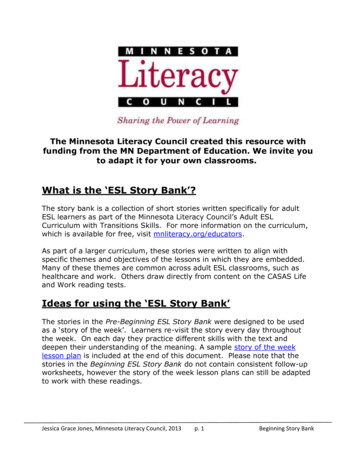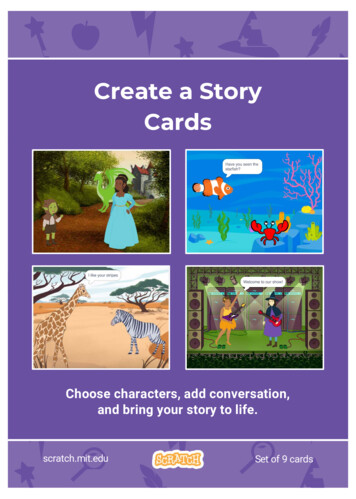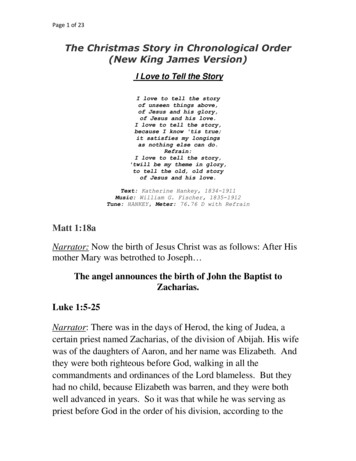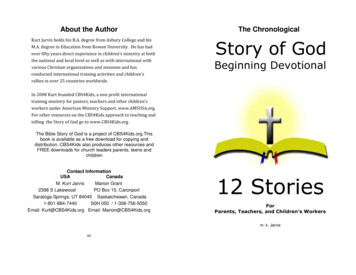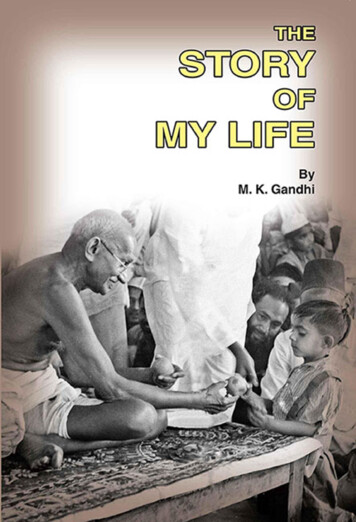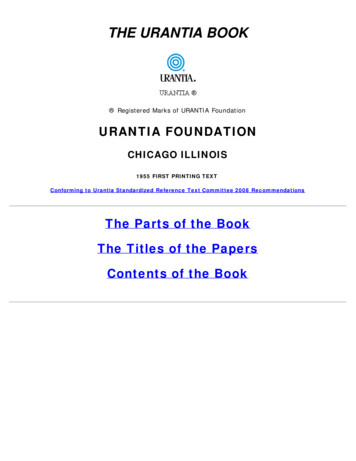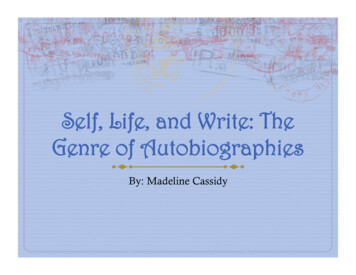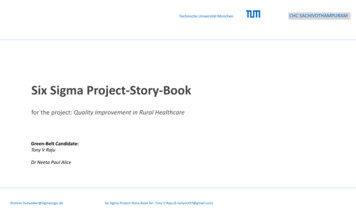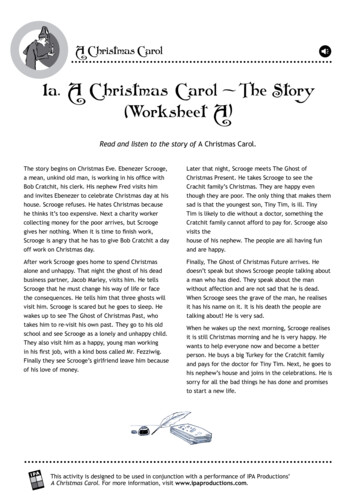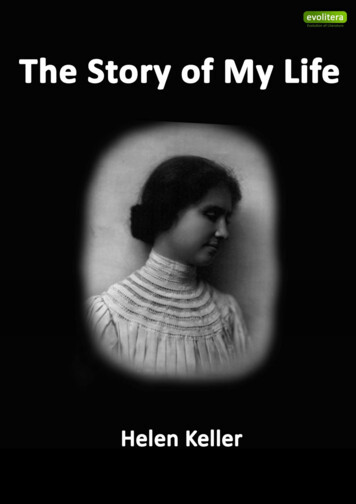
Transcription
i
ii
THE STORY OF MY LIFEBY HELEN KELLERWITH HER LETTERS (1887-1901)AND A SUPPLEMENTARY ACCOUNT OF HER EDUCATION,INCLUDING PASSAGES FROM THE REPORTS AND LETTERSOF HER TEACHER, ANNE MANSFIELD SULLIVANBy John Albert Macyiii
EVOLITERA EDITORIAL REVIEWThe Story of My Life is an autobiography of Helen Keller, the famous blind a anddeaf woman, who championed the rights of disabled people. The book detailsKeller’s childhood, as well as accounts given by her teacher, Anne Sullivan.Besides her autobiography, it also contain a collection of her correspondenceletters and accounts of her given by her educators including her lifelong tutor,Anne Sullivan. During the course of Keller’s life, though hampered by herhandicaps, she had written a few short stories. A collection of her short storiesis also a part of this book.iv
To ALEXANDER GRAHAM BELLWho has taught the deaf to speakand enabled the listening ear to hear speechfrom the Atlantic to the Rockies,I dedicatethis Story of My Life.v
PrefaceThis book is in three parts. The first two, Miss Keller's story and the extractsfrom her letters, form a complete account of her life as far as she can give it. Much ofher education she cannot explain herself, and since a knowledge of that is necessaryto an understanding of what she has written, it was thought best to supplement herautobiography with the reports and letters of her teacher, Miss Anne MansfieldSullivan. The addition of a further account of Miss Keller's personality andachievements may be unnecessary; yet it will help to make clear some of the traits ofher character and the nature of the work which she and her teacher have done.For the third part of the book the Editor is responsible, though all that is validin it he owes to authentic records and to the advice of Miss Sullivan.The Editor desires to express his gratitude and the gratitude of Miss Kellerand Miss Sullivan to The Ladies' Home Journal and to its editors, Mr. Edward Bokand Mr. William V. Alexander, who have been unfailingly kind and have given for usein this book all the photographs which were taken expressly for the Journal; and theEditor thanks Miss Keller's many friends who have lent him her letters to them andgiven him valuable information; especially Mrs. Laurence Hutton, who supplied himwith her large collection of notes and anecdotes; Mr. John Hitz, Superintendent ofthe Volta Bureau for the Increase and Diffusion of Knowledge relating to the Deaf;and Mrs. Sophia C. Hopkins, to whom Miss Sullivan wrote those illuminating letters,the extracts from which give a better idea of her methods with her pupil thananything heretofore published.Messrs. Houghton, Mifflin and Company have courteously permitted thereprinting of Miss Keller's letter to Dr. Holmes, which appeared in "Over theTeacups," and one of Whittier's letters to Miss Keller. Mr. S. T. Pickard, Whittier'sliterary executor, kindly sent the original of another letter from Miss Keller to Whittier.John Albert Macy. Cambridge, Massachusetts, February 1, 1903.vi
TABLE OF CONTENTSEditor's Preface .iiiPart I. The Story of My Life Chapter I-XXIII . 1II. Introduction to Letters, Letters 105III. A Supplementary Account of Helen Keller's Life andEducation . 226Chapter I. The Writing of the Book . 227II. Personality . 230III. Education . 243IV. Speech . 354V. Literary Style .vii 365
Part 1Part I. The Story of My Life1
Part 1Chapter IIt is with a kind of fear that I begin to write the history of my life. I have, as itwere, a superstitious hesitation in lifting the veil that clings about my childhood like agolden mist. The task of writing an autobiography is a difficult one. When I try toclassify my earliest impressions, I find that fact and fancy look alike across the yearsthat link the past with the present. The woman paints the child's experiences in herown fantasy. A few impressions stand out vividly from the first years of my life; but"the shadows of the prison-house are on the rest." Besides, many of the joys andsorrows of childhood have lost their poignancy; and many incidents of vitalimportance in my early education have been forgotten in the excitement of greatdiscoveries. In order, therefore, not to be tedious I shall try to present in a series ofsketches only the episodes that seem to me to be the most interesting andimportant.I was born on June 27, 1880, in Tuscumbia, a little town of northernAlabama.The family on my father's side is descended from Caspar Keller, a native ofSwitzerland, who settled in Maryland. One of my Swiss ancestors was the firstteacher of the deaf in Zurich and wrote a book on the subject of their education-rather a singular coincidence; though it is true that there is no king who has not hada slave among his ancestors, and no slave who has not had a king among his.My grandfather, Caspar Keller's son, "entered" large tracts of land inAlabama and finally settled there. I have been told that once a year he went fromTuscumbia to Philadelphia on horseback to purchase supplies for the plantation, andmy aunt has in her possession many of the letters to his family, which give charmingand vivid accounts of these trips.2
Part 1My Grandmother Keller was a daughter of one of Lafayette's aides,Alexander Moore, and granddaughter of Alexander Spotswood, an early ColonialGovernor of Virginia. She was also second cousin to Robert E. Lee.My father, Arthur H. Keller, was a captain in the Confederate Army, and mymother, Kate Adams, was his second wife and many years younger. Hergrandfather, Benjamin Adams, married Susanna E. Goodhue, and lived in Newbury,Massachusetts, for many years. Their son, Charles Adams, was born inNewburyport, Massachusetts, and moved to Helena, Arkansas. When the Civil Warbroke out, he fought on the side of the South and became a brigadier-general. Hemarried Lucy Helen Everett, who belonged to the same family of Everetts as EdwardEverett and Dr. Edward Everett Hale. After the war was over the family moved toMemphis, Tennessee.I lived, up to the time of the illness that deprived me of my sight and hearing,in a tiny house consisting of a large square room and a small one, in which theservant slept. It is a custom in the South to build a small house near the homesteadas an annex to be used on occasion. Such a house my father built after the CivilWar, and when he married my mother they went to live in it. It was completelycovered with vines, climbing roses and honeysuckles. From the garden it looked likean arbour. The little porch was hidden from view by a screen of yellow roses andSouthern smilax. It was the favourite haunt of humming-birds and bees.The Keller homestead, where the family lived, was a few steps from our littlerose-bower. It was called "Ivy Green" because the house and the surrounding treesand fences were covered with beautiful English ivy. Its old-fashioned garden was theparadise of my childhood.Even in the days before my teacher came, I used to feel along the squarestiff boxwood hedges, and, guided by the sense of smell would find the first violetsand lilies. There, too, after a fit of temper, I went to find comfort and to hide my hotface in the cool leaves and grass. What joy it was to lose myself in that garden offlowers, to wander happily from spot to spot, until, coming suddenly upon a beautiful3
Part 1vine, I recognized it by its leaves and blossoms, and knew it was the vine whichcovered the tumble-down summer-house at the farther end of the garden! Here,also, were trailing clematis, drooping jessamine, and some rare sweet flowers calledbutterfly lilies, because their fragile petals resemble butterflies' wings. But the roses-they were loveliest of all. Never have I found in the greenhouses of the North suchheart-satisfying roses as the climbing roses of my southern home. They used tohang in long festoons from our porch, filling the whole air with their fragrance,untainted by any earthy smell; and in the early morning, washed in the dew, theyfelt so soft, so pure, I could not help wondering if they did not resemble theasphodels of God's garden.The beginning of my life was simple and much like every other little life. Icame, I saw, I conquered, as the first baby in the family always does. There was theusual amount of discussion as to a name for me. The first baby in the family was notto be lightly named, every one was emphatic about that. My father suggested thename of Mildred Campbell, an ancestor whom he highly esteemed, and he declinedto take any further part in the discussion. My mother solved the problem by giving itas her wish that I should be called after her mother, whose maiden name was HelenEverett. But in the excitement of carrying me to church my father lost the name onthe way, very naturally, since it was one in which he had declined to have a part.When the minister asked him for it, he just remembered that it had been decided tocall me after my grandmother, and he gave her name as Helen Adams.I am told that while I was still in long dresses I showed many signs of aneager, self-asserting disposition. Everything that I saw other people do I insistedupon imitating. At six months I could pipe out "How d'ye," and one day I attractedevery one's attention by saying "Tea, tea, tea" quite plainly. Even after my illness Iremembered one of the words I had learned in these early months. It was the word"water," and I continued to make some sound for that word after all other speechwas lost. I ceased making the sound "wah-wah" only when I learned to spell theword.4
Part 1They tell me I walked the day I was a year old. My mother had just taken meout of the bath-tub and was holding me in her lap, when I was suddenly attracted bythe flickering shadows of leaves that danced in the sunlight on the smooth floor. Islipped from my mother's lap and almost ran toward them. The impulse gone, I felldown and cried for her to take me up in her arms.These happy days did not last long. One brief spring, musical with the songof robin and mocking-bird, one summer rich in fruit and roses, one autumn of goldand crimson sped by and left their gifts at the feet of an eager, delighted child. Then,in the dreary month of February, came the illness which closed my eyes and earsand plunged me into the unconsciousness of a new-born baby. They called it acutecongestion of the stomach and brain. The doctor thought I could not live. Early onemorning, however, the fever left me as suddenly and mysteriously as it had come.There was great rejoicing in the family that morning, but no one, not even the doctor,knew that I should never see or hear again.I fancy I still have confused recollections of that illness. I especiallyremember the tenderness with which my mother tried to soothe me in my walinghours of fret and pain, and the agony and bewilderment with which I awoke after atossing half sleep, and turned my eyes, so dry and hot, to the wall away from theonce-loved light, which came to me dim and yet more dim each day. But, except forthese fleeting memories, if, indeed, they be memories, it all seems very unreal, like anightmare. Gradually I got used to the silence and darkness that surrounded me andforgot that it had ever been different, until she came—my teacher--who was to setmy spirit free. But during the first nineteen months of my life I had caught glimpses ofbroad, green fields, a luminous sky, trees and flowers which the darkness thatfollowed could not wholly blot out. If we have once seen, "the day is ours, and whatthe day has shown."5
Part 1Chapter III cannot recall what happened during the first months after my illness. I onlyknow that I sat in my mother's lap or clung to her dress as she went about herhousehold duties. My hands felt every object and observed every motion, and in thisway I learned to know many things. Soon I felt the need of some communication withothers and began to make crude signs. A shake of the head meant "No" and a nod,"Yes," a pull meant "Come" and a push, "Go." Was it bread that I wanted? Then Iwould imitate the acts of cutting the slices and buttering them. If I wanted my motherto make ice-cream for dinner I made the sign for working the freezer and shivered,indicating cold. My mother, moreover, succeeded in making me understand a gooddeal. I always knew when she wished me to bring her something, and I would runupstairs or anywhere else she indicated. Indeed, I owe to her loving wisdomall that was bright and good in my long night.I understood a good deal of what was going on about me. At five I learnedto fold and put away the clean clothes when they were brought in from the laundry,and I distinguished my own from the rest. I knew by the way my mother and auntdressed when they were going out, and I invariably begged to go with them. I wasalways sent for when there was company, and when the guests took their leave, Iwaved my hand to them, I think with a vague remembrance of the meaning of thegesture. One day some gentlemen called on my mother, and I felt the shutting of thefront door and other sounds that indicated their arrival. On a sudden thought I ranupstairs before any one could stop me, to put on my idea of a company dress.Standing before the mirror, as I had seen others do, I anointed mine head with oiland covered my face thickly with powder. Then I pinned a veil over my head so thatit covered my face and fell in folds down to my shoulders, and tied an enormousbustle round my small waist, so that it dangled behind, almost meeting the hem ofmy skirt. Thus attired I went down to help entertain the company.I do not remember when I first realized that I was different from otherpeople; but I knew it before my teacher came to me. I had noticed that my mother6
Part 1and my friends did not use signs as I did when they wanted anything done, buttalked with their mouths. Sometimes I stood between two persons who wereconversing and touched their lips. I could not understand, and was vexed. I movedmy lips and gesticulated frantically without result. This made me so angry at timesthat I kicked and screamed until I was exhausted.I think I knew when I was naughty, for I knew that it hurt Ella, my nurse, tokick her, and when my fit of temper was over I had a feeling akin to regret. But Icannot remember any instance in which this feeling prevented me from repeating thenaughtiness when I failed to get what I wanted.In those days a little coloured girl, Martha Washington, the child of our cook,and Belle, an old setter, and a great hunter in her day, were my constantcompanions. Martha Washington understood my signs, and I seldom had anydifficulty in making her do just as I wished. It pleased me to domineer over her, andshe generally submitted to my tyranny rather than risk a hand-to-hand encounter. Iwas strong, active, indifferent to consequences. I knew my own mind well enoughand always had my own way, even if I had to fight tooth and nail for it. We spent agreat deal of time in the kitchen, kneading dough balls, helping make ice-cream,grinding coffee, quarreling over the cake-bowl, and feeding the hens and turkeys thatswarmed about the kitchen steps. Many of them were so tame that they would eatfrom my hand and let me feel them. One big gobbler snatched a tomato from meone day and ran away with it. Inspired, perhaps, by Master Gobbler's success, wecarried off to the woodpile a cake which the cook had just frosted, and ate every bitof it. I was quite ill afterward, and I wonder if retribution also overtook the turkey.The guinea-fowl likes to hide her nest in out-of-the-way places, and it wasone of my greatest delights to hunt for the eggs in the long grass. I could not tellMartha Washington when I wanted to go egg-hunting, but I would double my handsand put them on the ground, which meant something round in the grass, and Marthaalways understood. When we were fortunate enough to find a nest I never allowedher to carry the eggs home, making her understand by emphatic signs that she mightfall and break them.7
Part 1The sheds where the corn was stored, the stable where the horses werekept, and the yard where the cows were milked morning and evening were unfailingsources of interest to Martha and me. The milkers would let me keep my hands onthe cows while they milked, and I often got well switched by the cow for my curiosity.The making ready for Christmas was always a delight to me. Of course I didnot know what it was all about, but I enjoyed the pleasant odours that filled the houseand the tidbits that were given to Martha Washington and me to keep us quiet. Wewere sadly in the way, but that did not interfere with our pleasure in the least. Theyallowed us to grind the spices, pick over the raisins and lick the stirring spoons. Ihung my stocking because the others did; I cannot remember, however, that theceremony interested me especially, nor did my curiosity cause me to wake beforedaylight to look for my gifts.Martha Washington had as great a love of mischief as I. Two little childrenwere seated on the veranda steps one hot July afternoon. One was black as ebony,with little bunches of fuzzy hair tied with shoestrings sticking out all over her headlike corkscrews. The other was white, with long golden curls. One child was six yearsold, the other two or three years older. The younger child was blind--that was I--andthe other was Martha Washington. We were busy cutting out paper dolls; but wesoon wearied of this amusement, and after cutting up our shoestrings and clipping allthe leaves off the honeysuckle that were within reach, I turned my attention toMartha's corkscrews. She objected at first, but finally submitted. Thinking that turnand turn about is fair play, she seized the scissors and cut off one of my curls, andwould have cut them all off but for my mother's timely interference.Belle, our dog, my other companion, was old and lazy and liked to sleep bythe open fire rather than to romp with me. I tried hard to teach her my sign language,but she was dull and inattentive. She sometimes started and quivered withexcitement, then she became perfectly rigid, as dogs do when they point a bird. I didnot then know why Belle acted in this way; but I knew she was not doing as I wished.This vexed me and the lesson always ended in a one-sided boxing match. Belle8
Part 1would get up, stretch herself lazily, give one or two contemptuous sniffs, go to theopposite side of the hearth and lie down again, and I, wearied and disappointed,went off in search of Martha.Many incidents of those early years are fixed in my memory, isolated, butclear and distinct, making the sense of that silent, aimless, dayless life all the moreintense.One day I happened to spill water on my apron, and I spread it out to drybefore the fire which was flickering on the sitting-room hearth. The apron did not dryquickly enough to suit me, so I drew nearer and threw it right over the hot ashes. Thefire leaped into life; the flames encircled me so that in a moment my clothes wereblazing. I made a terrified noise that brought Viny, my old nurse, to the rescue.Throwing a blanket over me, she almost suffocated me, but she put out the fire.Except for my hands and hair I was not badly burned.About this time I found out the use of a key. One morning I locked mymother up in the pantry, where she was obliged to remain three hours, as theservants were in a detached part of the house. She kept pounding on the door, whileI sat outside on the porch steps and laughed with glee as I felt the jar of thepounding. This most naughty prank of mine convinced my parents that I must betaught as soon as possible. After my teacher, Miss Sullivan, came to me, I sought anearly opportunity to lock her in her room. I went upstairs with something which mymother made me understand I was to give to Miss Sullivan; but no sooner had Igiven it to her than I slammed the door to, locked it, and hid the key under thewardrobe in the hall. I could not be induced to tell where the key was. My father wasobliged to get a ladder and take Miss Sullivan out through the window--much to mydelight. Months after I produced the key.When I was about five years old we moved from the little vine-coveredhouse to a large new one. The family consisted of my father and mother, two olderhalf-brothers, and, afterward, a little sister, Mildred. My earliest distinct recollection ofmy father is making my way through great drifts of newspapers to his side andfinding him alone, holding a sheet of paper before his face. I was greatly puzzled to9
Part 1know what he was doing. I imitated this action, even wearing his spectacles, thinkingthey might help solve the mystery. But I did not find out the secret for several years.Then I learned what those papers were, and that my father edited one of them.My father was most loving and indulgent, devoted to his home, seldomleaving us, except in the hunting season. He was a great hunter, I have been told,and a celebrated shot. Next to his family he loved his dogs and gun. His hospitalitywas great, almost to a fault, and he seldom came home without bringing a guest. Hisspecial pride was the big garden where, it was said, he raised the finest watermelonsand strawberries in the county; and to me he brought the first ripe grapes and thechoicest berries. I remember his caressing touch as he led me from tree to tree, fromvine to vine, and his eager delight in whatever pleased me.He was a famous story-teller; after I had acquired language he used to spellclumsily into my hand his cleverest anecdotes, and nothing pleased him more thanto have me repeat them at an opportune moment.I was in the North, enjoying the last beautiful days of the summer of 1896,when I heard the news of my father's death. He had had a short illness, there hadbeen a brief time of acute suffering, then all was over. This was my first greatsorrow—my first personal experience with death.How shall I write of my mother? She is so near to me that it almost seemsindelicate to speak of her.For a long time I regarded my little sister as an intruder. I knew that I hadceased to be my mother's only darling, and the thought filled me with jealousy. Shesat in my mother's lap constantly, where I used to sit, and seemed to take up all hercare and time. One day something happened which seemed to me to be addinginsult to injury.At that time I had a much-petted, much-abused doll, which I afterwardnamed Nancy. She was, alas, the helpless victim of my outbursts of temper and of10
Part 1affection, so that she became much the worse for wear. I had dolls which talked, andcried, and opened and shut their eyes; yet I never loved one of them as I loved poorNancy. She had a cradle, and I often spent an hour or more rocking her. I guardedboth doll and cradle with the most jealous care; but once I discovered my little sistersleeping peacefully in the cradle. At this presumption on the part of one to whom asyet no tie of love bound me I grew angry. I rushed upon the cradle and over-turned it,and the baby might have been killed had my mother not caught her as she fell. Thusit is that when we walk in the valley of twofold solitude we know little of the tenderaffections that grow out of endearing words and actions and companionship. Butafterward, when I was restored to my human heritage, Mildred and I grew into eachother's hearts, so that we were content to go hand-in-hand wherever caprice led us,although she could not understand my finger language, nor I her childishprattle.11
Part 1Chapter IIIMeanwhile the desire to express myself grew. The few signs I used becameless and less adequate, and my failures to make myself understood were invariablyfollowed by outbursts of passion. I felt as if invisible hands were holding me, and Imade frantic efforts to free myself. I struggled--not that struggling helped matters, butthe spirit of resistance was strong within me; I generally broke down in tears andphysical exhaustion. If my mother happened to be near I crept into her arms, toomiserable even to remember the cause of the tempest. After awhile the need ofsome means of communication became so urgent that these outbursts occurreddaily, sometimes hourly.My parents were deeply grieved and perplexed. We lived a long way fromany school for the blind or the deaf, and it seemed unlikely that any one would cometo such an out-of-the-way place as Tuscumbia to teach a child who was both deafand blind. Indeed, my friends and relatives sometimes doubted whether I could betaught. My mother's only ray of hope came from Dickens's "American Notes." Shehad read his account of Laura Bridgman, and remembered vaguely that she wasdeaf and blind, yet had been educated. But she also remembered with a hopelesspang that Dr. Howe, who had discovered the way to teach the deaf and blind, hadbeen dead many years. His methods had probably died with him; and if they had not,how was a little girl in a far-off town in Alabama to receive the benefit of them?When I was about six years old, my father heard of an eminent oculist inBaltimore, who had been successful in many cases that had seemed hopeless. Myparents at once determined to take me to Baltimore to see if anything could be donefor my eyes.The journey, which I remember well was very pleasant. I made friends withmany people on the train. One lady gave me a box of shells. My father made holes inthese so that I could string them, and for a long time they kept me happy andcontented. The conductor, too, was kind. Often when he went his rounds I clung12
Part 1to his coat tails while he collected and punched the tickets. His punch, with which helet me play, was a delightful toy. Curled up in a corner of the seat I amused myselffor hours making funny little holes in bits of cardboard.My aunt made me a big doll out of towels. It was the most comicalshapeless thing, this improvised doll, with no nose, mouth, ears or eyes--nothing thateven the imagination of a child could convert into a face. Curiously enough, theabsence of eyes struck me more than all the other defects put together. I pointed thisout to everybody with provoking persistency, but no one seemed equal to the task ofproviding the doll with eyes. A bright idea, however, shot into my mind, and theproblem was solved. I tumbled off the seat and searched under it until I found myaunt's cape, which was trimmed with large beads. I pulled two beads off andindicated to her that I wanted her to sew them on my doll. She raised my hand to hereyes in a questioning way, and I nodded energetically. The beads were sewed in theright place and I could not contain myself for joy; but immediately I lost all interest inthe doll. During the whole trip I did not have one fit of temper, there were so manythings to keep my mind and fingers busy.When we arrived in Baltimore, Dr. Chisholm received us kindly: but he coulddo nothing. He said, however, that I could be educated, and advised my father toconsult Dr. Alexander Graham Bell of Washington, who would be able to give himinformation about schools and teachers of deaf or blind children. Acting on thedoctor's advice, we went immediately to Washington to see Dr. Bell, my father with asad heart and many misgivings, I wholly unconscious of his anguish, finding pleasurein the excitement of moving from place to place. Child as I was, I at once felt thetenderness and sympathy which endeared Dr. Bell to so many hearts, as hiswonderful achievements enlist their admiration. He held me on his knee while Iexamined his watch, and he made it strike for me. He understood my signs, and Iknew it and loved him at once. But I did not dream that that interview would be thedoor through which I should pass from darkness into light, from isolation tofriendship, companionship, knowledge, love.13
Part 1Dr. Bell advised my father to write to Mr. Anagnos, director of the PerkinsInstitution in Boston, the scene of Dr. Howe's great labours for the blind, and ask himif he had a teacher competent to begin my education. This my father did at once, andin a few weeks there came a kind letter from Mr. Anagnos with the comfortingassurance that a teacher had been found. This was in the summer of 1886. But MissSullivan did not arrive until the following March.Thus I came up out of Egypt and stood before Sinai, and a power divinetouched my spirit and gave it sight, so that I beheld many wonders. And from thesacred mountain I heard a voice which said, "Knowledge is love and light andvision."14
Part 1Chapter IVThe most important day I remember in all my life is the one on which myteacher, Anne Mansfield Sullivan, came to me. I am filled with wonder when Iconsider the immeasurable contrasts between the two lives which it connects. It wasthe third of March, 1887, three months before I was seven years old.On the afternoon of that eventful day, I stood on the porch, dumb,expectant. I guessed vaguely from my mother's signs and from the hurrying to andfro in the house that something unusual was about to happen, so I went to the doorand waited on the steps. The afternoon sun penetrated the mass of honeysuckle thatcovered the porch, and fell on my upturned face. My fingers lingered almostunconsciously on the familiar leaves and blossoms which had just come forth togreet the sweet southern spring. I did not know what the future held of marvel orsurprise for me. Anger and bitterness had preyed upon me continually for weeks anda deep languor had succeeded this passionate struggle.Have you ever been at sea in a dense fog, when it seemed as if a tangiblewhite darkness shut you in, and the great ship, tense and anxious, groped her waytoward the shore with plummet and sounding-line, and you waited with beating heartfor something to happen? I was like that ship before my education be
The Story of My Life is an autobiography of Helen Keller, the famous blind a and deaf woman, who championed the rights of disabled people. The book details Keller’s childhood, as well as accounts given by her teacher, Anne Sullivan. Besides her autobiography, it also contain a collection of her correspondence
